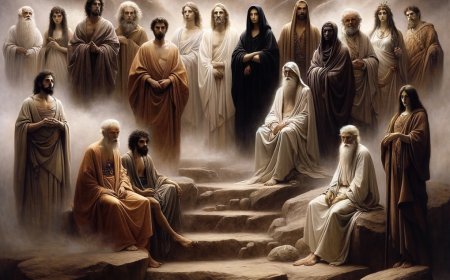The Mingling of Law and Grace
The church of Jesus Christ is no longer under the laws of the Old Testament and is not obligated to keep the Ten Commandments as the children of Israel were.

“For the law was given by Moses, but grace and truth came by Jesus Christ” (John 1:17).
The church of Jesus Christ is no longer under the laws of the Old Testament and is not obligated to keep the Ten Commandments as the children of Israel were. All believers born again of water and of the Spirit need only act out of love, and allow the Holy Ghost to refine and perfect the soul.
No more do we as Christians have to walk according to the flesh, practicing such laws of the Old Testament as offering sacrifices of the blood of animals and obeying the eye for an eye, and tooth for tooth ordinance. Faith compels our walk in salvation “For as many as are of the works of the law are under the curse: for it is written, Cursed is every one that continueth not in all things which are written in the book of the law to do them. But that no man is justified by the law in the sight of God, it is evident: The just shall live by faith” (Gal. 3:10, 11).
People who have not received the Holy Ghost must obey the Law and are those whom God will judge by the Law. Jesus said He has not come to destroy the Law, but to fulfill it, meaning the Law will remain in force for those in the world and who are not in the body of Christ. Furthermore, as the scripture above states, if a person practices any one part of the Law then they are obligated to practice the entire Law.
The scripture also says that the Law is a curse. Grace alone is a blessing and we please God by walking in faith, believing and practicing the promises of grace. Preachers do not emphasize enough the significant differences between Law and grace, nor do they understand the effect of practicing certain parts of the Law while the church is currently in the age of grace.
The church today is mingling the two, law and grace, which cause confusion and disorder in the worship order of the church. In fact, the God of the Old Testament (Jehovah) and the God of the New Testament (Jesus) are different gods when relating to believers. Although they are the same God, they reach out to believers from two different covenants, and this gives a secondary meaning to the parable of mixing the two.
Jehovah God, also known as the All Mighty and the Most High God, sometimes carried an angry overtone. He was firm and people were afraid of Him. When He communicated with humankind, He answered with bold and sometimes vengeful acts of nature like the parting of the Red Sea and the sending forth of the Flood, things He does not do today. He spoke to only a few people at a time whereas today He, as Jesus, speaks to as many as will receive Him.
This is the main difference between the two, the way they communicate with the world. Jehovah did not make himself known personally to thousands and millions as Jesus does today, but Jehovah said, “And it shall come to pass in the last days, saith God, I will pour out of my Spirit upon all flesh” (Joel 2:28). He fulfilled His promise on the day of Pentecost and the early church was the result of that promise. Therefore, everything relating to God now comes in a personal manner, not a national or tribal manner. Now anyone can come to God regardless of race, creed, or what nation they are from, and are no longer considered heathens as people were then.
One man refused to believe in Jesus because he connected the salvation of Jesus with, what he thought in his mind to be, a war faring, unkind, and unmerciful god [Jehovah] of the Old Testament, and the man never gave Jesus Christ a chance. Instead of receiving the grace of the New Testament, he felt duty-bound and chose rather to observe the laws of the Ten Commandments.
However, he admitted that he could not refrain his flesh entirely from committing acts of adultery, thievery, or any of the other commandments. Furthermore, he acknowledged the manner of punishment Jehovah would bring on him for his sins and when told about the graceful spirit of the Holy Ghost and the gentleness of Christ, he remained resistant because of his misguided fear of God and what he learned in the past about Him.
Many people, as the man is, remain unlearned of the grace of Jesus Christ and of the transformation from the Old Testament to the New Testament, and by church leaders teaching concepts of the Old Testament to people today, they do not help to dispel these misguided fears.
Today, preachers enforce the Old Testament deed of tithing on believers along with the curses of the Old Testament that come with tithing. When preachers enforce the deed of tithing, and because tithing is an aspect of the Law, those who practice tithing will eventually feel the same fear the man felt. With the Law comes the curse of the Law and with the curse comes the punishment of Jehovah. Yet, preachers do not enforce any of the other aspects of the Law, such as sacrificing animals and cleansing the temple with divers washings and carnal ordinances.
The New Testament plainly states that the believers of Jesus Christ are no longer under the curses and rituals of the Law, but under the grace and liberty of Jesus Christ. Therefore, because of those preachers who enforce tithes, believers who follow them are bound by the law of tithing and by the curse of the Law, while at the same time attempting to serve under the grace of Jesus Christ. This is an impossible endeavor according to Jesus and His example of the parable of mingling old wine with new wine. Law and grace do not mix and when tried, believers could easily lose sight of what is acceptable to God and what is not.
Preachers disregard the grace of God when it is about money. They will go with the Old and not with the New. The New Testament upholds the power of giving and giving is what the early church did, and they supported one another by communal support. However, today’s church will not practice communal support of one another because of how we live today.
The Old Testament enforced the act of sacrificing the blood of dead animals, but preachers do not enforce this, neither would the world today accept it as normal religious practice but would consider it unethical. Yet, in the Old Testament days, sacrificing animals was an expected part of worship as was tithing because they were both lawful religious ordinances; therefore, as sacrificing the blood of animals would be considered unethical today, then the law of tithing should be considered unethical also.
However, the only reason preachers enforce the law of tithing today is that it guarantees financial support for the church, and for themselves, just as the harvest supported the nation of Israel and the Levites in the Old Testament.
Preachers today do not discuss the issue of divorce; which was another unfavorable act of the Old Testament. Though allowed by Moses, divorce is discouraged under the grace of Jesus Christ. “He saith unto them, Moses because of the hardness of your hearts suffered you to put away your wives: but from the beginning it was not so” (Matt. 19:8). Initially, divorce was against the nature of God’s purpose, but today, people divorce all the time.
Marriage is a sacred joining-together of man and woman by God, and the children of Israel broke that sacredness and pressed upon Moses to allow them to put away their spouses. Spiritual marriage is a remarkable mystery in the gospel of salvation and according to the New Testament; it represents the body of Christ as the bride and Christ as the Bridegroom, (Ephesians 5:32). In this figurative allusion, Jesus would never divorce His bride, the Church, yet preachers do not attempt to uncover the revelation of this great mystery; instead, they place great emphasis on tithing and tithing alone.
No other act or deed of the Old Testament has carried over into grace by today’s preachers but tithing, and the reason is that money has taken priority in the church as it has in society, and we know that the love of money is the root of all evil. If bound by the laws of the Old Testament, a believer cannot fulfill the faith of Jesus Christ; it is impossible. “Stand fast therefore in the liberty wherewith Christ hath made us free, and be not entangled again with the yoke of bondage” (Gal. 5:1).
Having faith is the only way we can please God. We must trust in Him and in our brethren, not in the natural things of life, things we can see.
Faith is the evidence of things not seen, not things seen. It is the substance of things hoped for, not the actual substance of things. We cannot think that depending on the harvest is having faith because the harvest will come regardless. We must trust in the providing power of God. Having a job and waiting for Friday to come is not faith though this is what the church is doing, waiting on Friday and everyone’s paycheck.
Many large churches do not depend on God to sustain them as they should, but they depend on the congregation’s money. Although it seems logical to depend on money for physical stability, when a church comes to this point, they have fallen from the grace and faith of God and into the substances and things of the world, and they rely on the things of the world to sustain them. Mingling the laws of the Old Testament with the faith and grace of the New Testament is a dangerous thing because the believers of Christ are no longer under the Commandments of the Law.














































